Abstract
Non-specific binding in an ELISA test for antibodies to cardiolipin (ACA) was investigated in sera from patients with primary biliary cirrhosis, rheumatological disorders, and repeated abortion. Binding to wells without phospholipid was most frequent in ELISA assay for IgM class ACA and correlated with levels of serum polyclonal IgM in patients with repeated abortion and rheumatologic disorders (r = 0.79, 0.76). Using added polyclonal IgM we demonstrated that the increase in non-specific binding was most significant when levels of ACA were low; subtraction of binding to the unoccupied well over-corrected specific antibody estimates when a high affinity antibody was present. Absorption studies on three sera suggest that this 'non-specific' binding includes low affinity antibody binding. Elevated levels of polyclonal IgM in sera from patients with repeated abortion may account for some reports of elevated IgM class antibodies in other ELISA assays. The prevalence of a positive test for ACA in a sequential series of 412 such patients was reduced to 6.1% (95% confidence limits 4-9%) after subtraction of non-specific binding.
Full text
PDF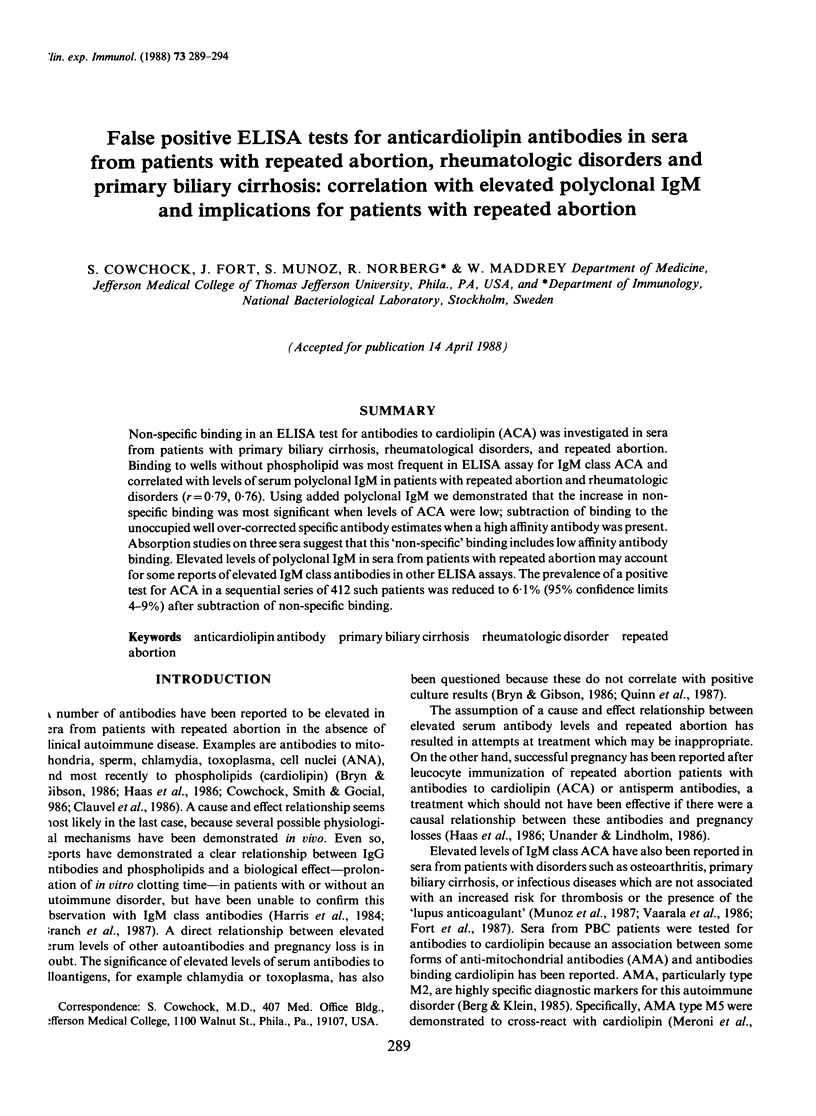
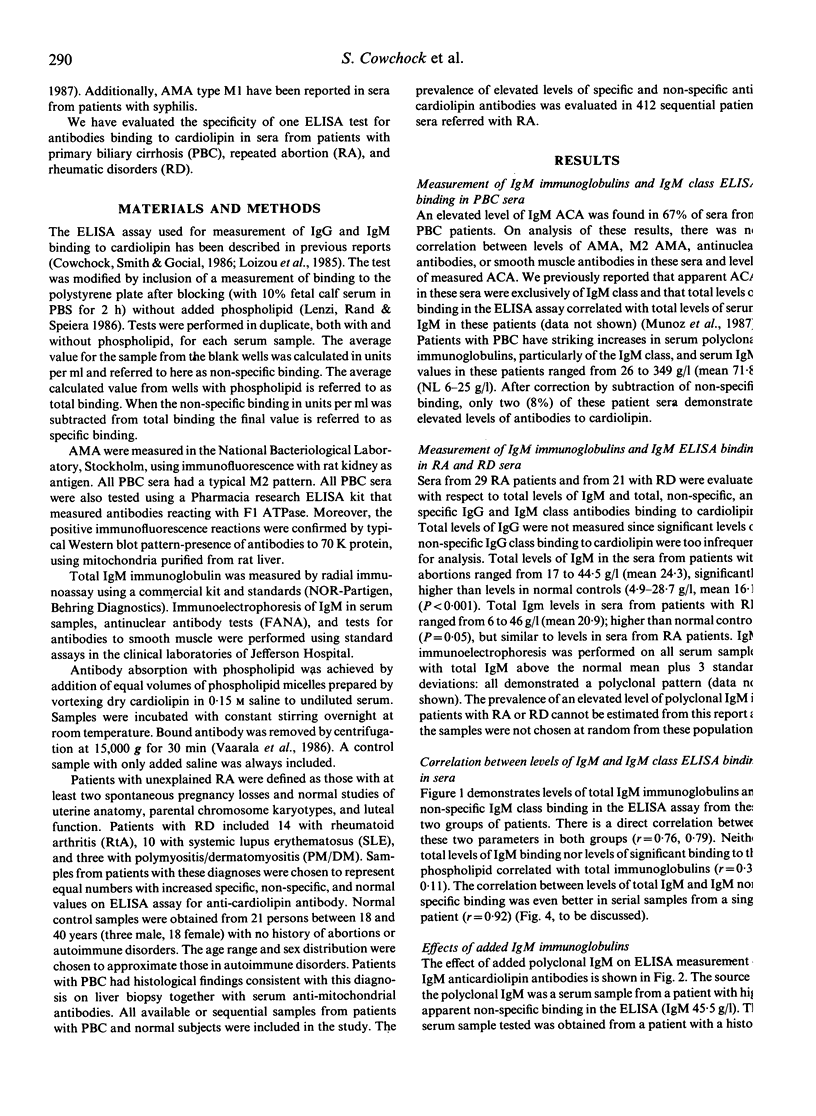
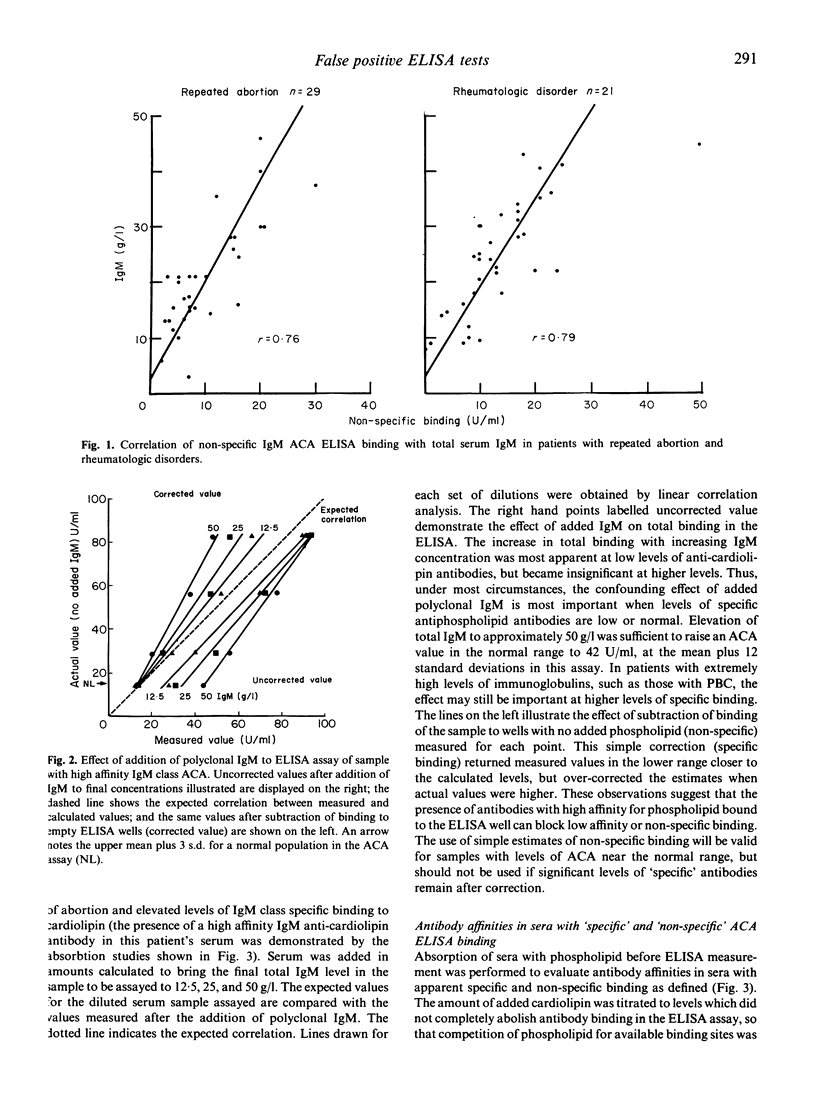
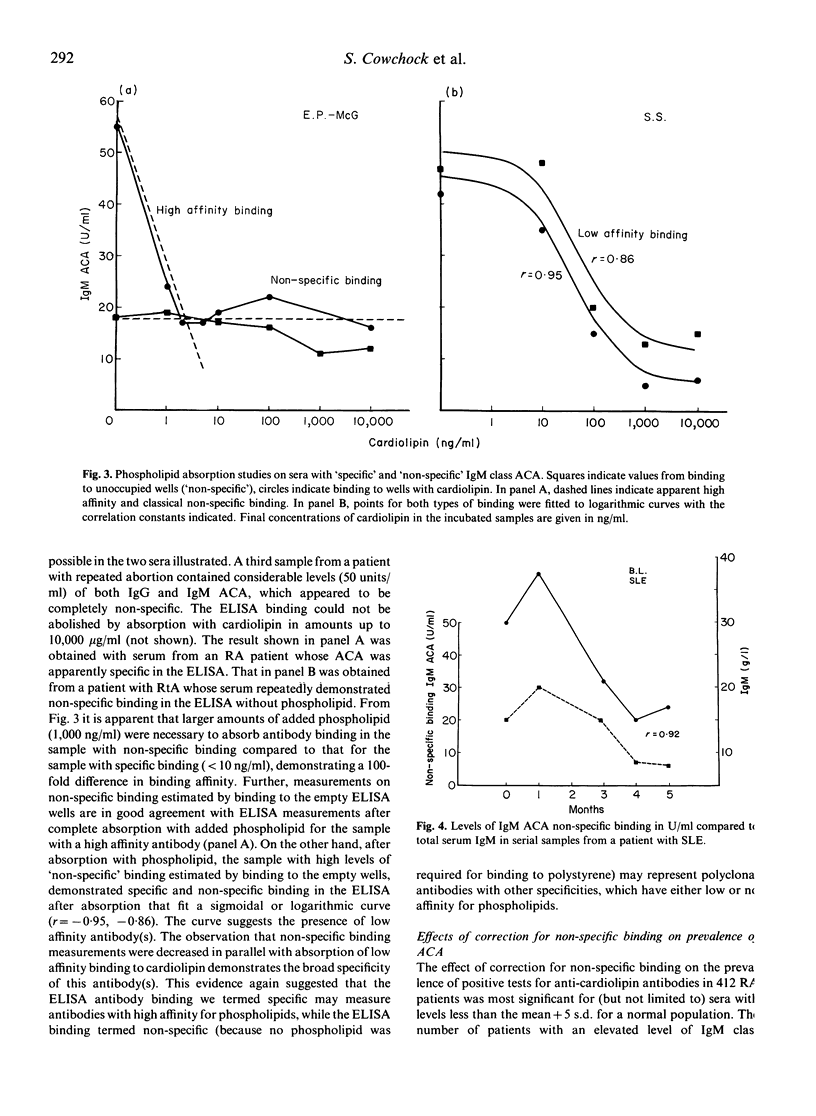
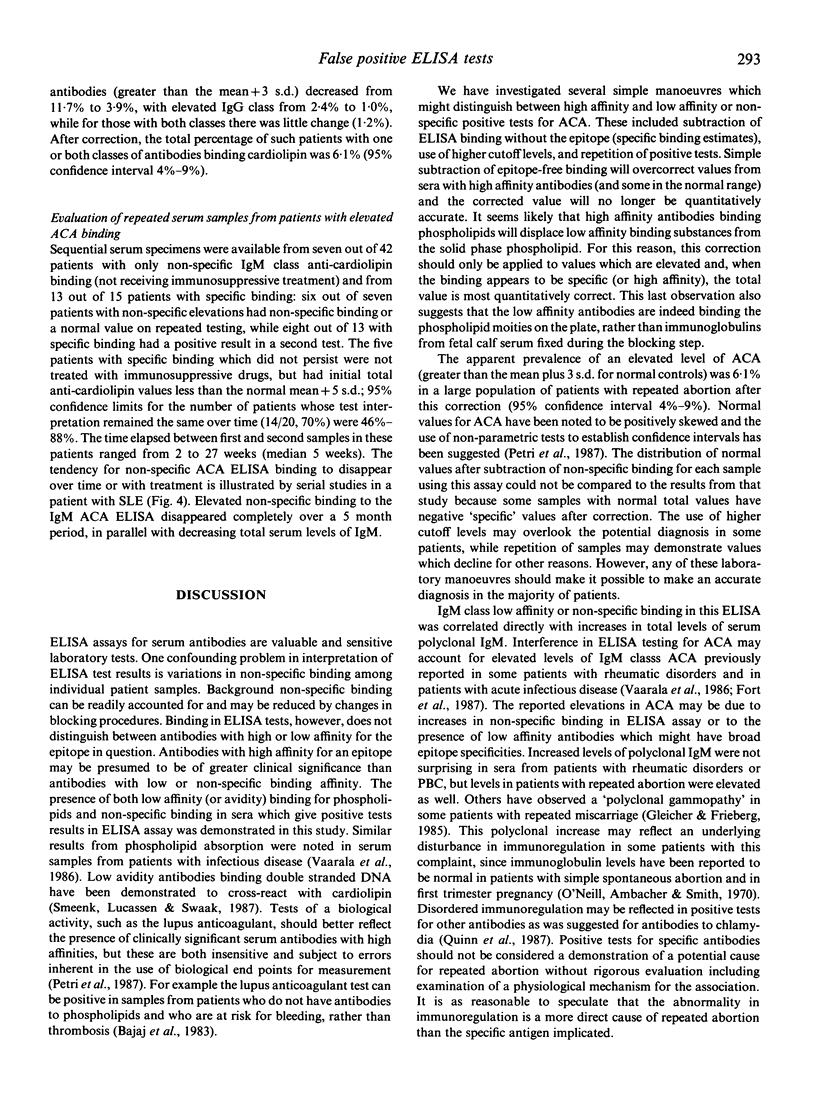
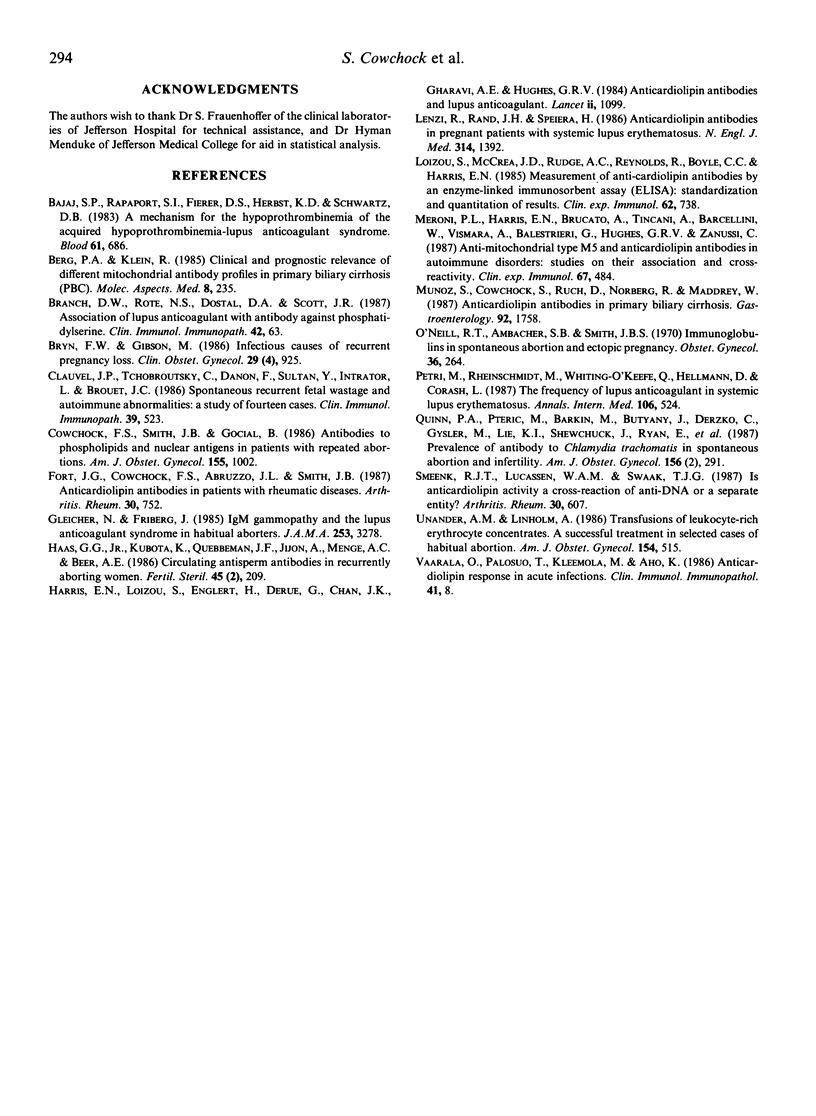
Selected References
These references are in PubMed. This may not be the complete list of references from this article.
- Berg P. A., Klein R. Clinical and prognostic relevance of different mitochondrial antibody profiles in primary biliary cirrhosis (PBC). Mol Aspects Med. 1985;8(3):235–247. doi: 10.1016/0098-2997(85)90008-1. [DOI] [PubMed] [Google Scholar]
- Branch D. W., Rote N. S., Dostal D. A., Scott J. R. Association of lupus anticoagulant with antibody against phosphatidylserine. Clin Immunol Immunopathol. 1987 Jan;42(1):63–75. doi: 10.1016/0090-1229(87)90173-5. [DOI] [PubMed] [Google Scholar]
- Byrn F. W., Gibson M. Infectious causes of recurrent pregnancy loss. Clin Obstet Gynecol. 1986 Dec;29(4):925–940. doi: 10.1097/00003081-198612000-00017. [DOI] [PubMed] [Google Scholar]
- Clauvel J. P., Tchobroutsky C., Danon F., Sultan Y., Intrator L., Brouet J. C. Spontaneous recurrent fetal wastage and autoimmune abnormalities: a study of fourteen cases. Clin Immunol Immunopathol. 1986 Jun;39(3):523–530. doi: 10.1016/0090-1229(86)90179-0. [DOI] [PubMed] [Google Scholar]
- Cowchock S., Smith J. B., Gocial B. Antibodies to phospholipids and nuclear antigens in patients with repeated abortions. Am J Obstet Gynecol. 1986 Nov;155(5):1002–1010. doi: 10.1016/0002-9378(86)90335-2. [DOI] [PubMed] [Google Scholar]
- Fort J. G., Cowchock F. S., Abruzzo J. L., Smith J. B. Anticardiolipin antibodies in patients with rheumatic diseases. Arthritis Rheum. 1987 Jul;30(7):752–760. doi: 10.1002/art.1780300705. [DOI] [PubMed] [Google Scholar]
- Gleicher N., Friberg J. IgM gammopathy and the lupus anticoagulant syndrome in habitual aborters. JAMA. 1985 Jun 14;253(22):3278–3281. [PubMed] [Google Scholar]
- Haas G. G., Jr, Kubota K., Quebbeman J. F., Jijon A., Menge A. C., Beer A. E. Circulating antisperm antibodies in recurrently aborting women. Fertil Steril. 1986 Feb;45(2):209–215. doi: 10.1016/s0015-0282(16)49156-9. [DOI] [PubMed] [Google Scholar]
- Harris E. N., Loizou S., Englert H., Derue G., Chan J. K., Gharavi A. E., Hughes G. R. Anticardiolipin antibodies and lupus anticoagulant. Lancet. 1984 Nov 10;2(8411):1099–1099. doi: 10.1016/s0140-6736(84)91537-x. [DOI] [PubMed] [Google Scholar]
- Lenzi R., Rand J. H., Spiera H. Anticardiolipin antibodies in pregnant patients with systemic lupus erythematosus. N Engl J Med. 1986 May 22;314(21):1392–1393. doi: 10.1056/NEJM198605223142118. [DOI] [PubMed] [Google Scholar]
- Loizou S., McCrea J. D., Rudge A. C., Reynolds R., Boyle C. C., Harris E. N. Measurement of anti-cardiolipin antibodies by an enzyme-linked immunosorbent assay (ELISA): standardization and quantitation of results. Clin Exp Immunol. 1985 Dec;62(3):738–745. [PMC free article] [PubMed] [Google Scholar]
- Meroni P. L., Harris E. N., Brucato A., Tincani A., Barcellini W., Vismara A., Balestrieri G., Hughes G. R., Zanussi C. Anti-mitochondrial type M5 and anti-cardiolipin antibodies in autoimmune disorders: studies on their association and cross-reactivity. Clin Exp Immunol. 1987 Mar;67(3):484–491. [PMC free article] [PubMed] [Google Scholar]
- O'Neill R. T., Ambacher S. B., Smith J. B. Immunoglobulins in spontaneous abortion and ectopic pregnancy. Obstet Gynecol. 1970 Aug;36(2):264–267. [PubMed] [Google Scholar]
- Petri M., Rheinschmidt M., Whiting-O'Keefe Q., Hellmann D., Corash L. The frequency of lupus anticoagulant in systemic lupus erythematosus. A study of sixty consecutive patients by activated partial thromboplastin time, Russell viper venom time, and anticardiolipin antibody level. Ann Intern Med. 1987 Apr;106(4):524–531. doi: 10.7326/0003-4819-106-4-524. [DOI] [PubMed] [Google Scholar]
- Quinn P. A., Petric M., Barkin M., Butany J., Derzko C., Gysler M., Lie K. I., Shewchuck A. B., Shuber J., Ryan E. Prevalence of antibody to Chlamydia trachomatis in spontaneous abortion and infertility. Am J Obstet Gynecol. 1987 Feb;156(2):291–296. doi: 10.1016/0002-9378(87)90270-5. [DOI] [PubMed] [Google Scholar]
- Smeenk R. J., Lucassen W. A., Swaak T. J. Is anticardiolipin activity a cross-reaction of anti-DNA or a separate entity? Arthritis Rheum. 1987 Jun;30(6):607–617. doi: 10.1002/art.1780300602. [DOI] [PubMed] [Google Scholar]
- Vaarala O., Palosuo T., Kleemola M., Aho K. Anticardiolipin response in acute infections. Clin Immunol Immunopathol. 1986 Oct;41(1):8–15. doi: 10.1016/0090-1229(86)90046-2. [DOI] [PubMed] [Google Scholar]


